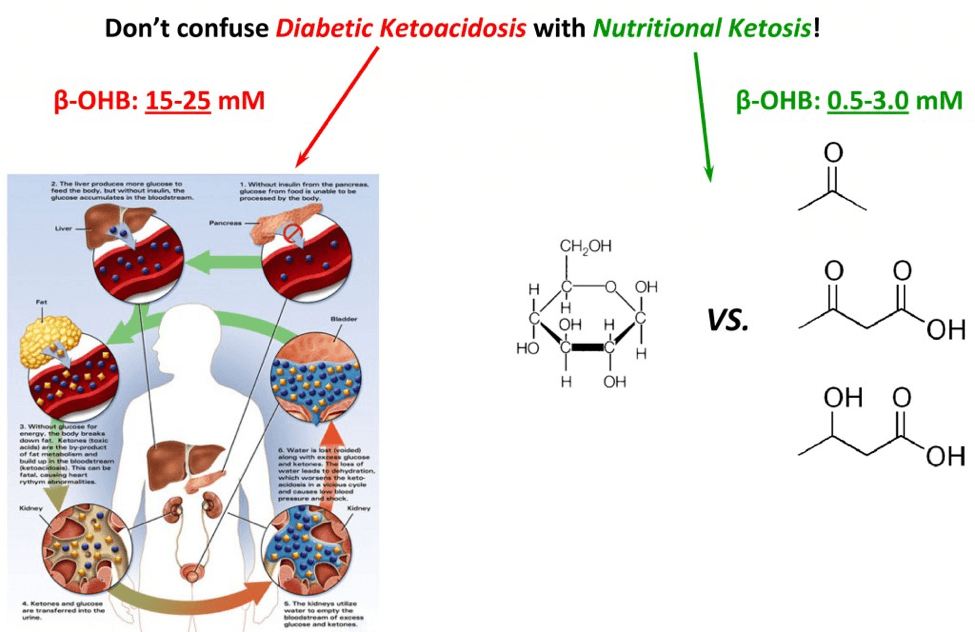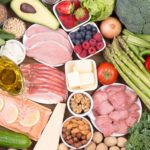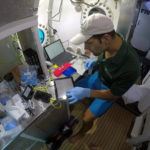You may have heard from your doctor that ketosis is a life-threatening condition. If so, your doctor is confusing diabetic ketoacidosis (DKA) with nutritional ketosis, or keto-adaptation.
First, some semantics. Our body can produce, from fat and some amino acids, three ketone bodies (a “ketone” refers to the chemical structure where oxygen is double-bonded to carbon sandwiched between at least 2 other carbons). These ketone bodies we produce are: acetone, acetoacetone, and beta-hydroxybutyrate (B-OHB). [For anyone who is interested, they are the 3 most right structures on the figure, below.]
Why do we make ketones? For starters, it’s a vital evolutionary advantage. Our brain can only function with glucose and ketones. Since we can’t store more than about 24 hours’ worth of glucose, we would all die of hypoglycemia if ever forced to fast for more than a day. Fortunately, our liver can take fat and select amino acids (the building blocks of proteins) and turn them into ketones, first and foremost to feed our brains. Hence, our body’s ability to produce ketones is required for basic survival.
What is diabetic ketoacidosis? When diabetics (usually Type I diabetics, but sometimes this occurs in very late-stage, insulin-dependent, Type II diabetics) fail to receive enough insulin, they go into an effective state of starvation. While they may have all the glucose in the world in their bloodstream, without insulin, they can’t get any into their cells. Hence, they are effectively going into starvation. The body does what it would do in anyone – it starts to make ketones out of fat and proteins. Here’s the problem: the diabetic patient in this case can’t produce any insulin, so there is no feedback loop and they continue to produce more and more ketones without stopping. By the time ketone levels (specifically, beta-hydroxybutyrate) approach 15 to 25 mM, the resulting pH imbalance leads to profound metabolic derangement and the patient is critically ill.
But this state of metabolic derangement is not actually possible in a person who can produce insulin, even in small amounts. The reason is that a feedback loop prevents the ketone level from getting high enough to cause the change in pH that leads to the cascade of bad problems. A person who is said to be “keto-adapted,” or in a state of nutritional ketosis, generally has beta-hydroxybutyrate levels between about 0.5 and 3.0 mM. This is far less than the levels required to cause harm through acid-base abnormalities.
Keto-adaption is a state, achieved through significant reduction of carbohydrate intake (typically to less than 50 grams per day) and moderate protein, where the body changes from relying on glycogen as its main source of energy to relying on fat. Specifically, the brain shifts from being primarily dependent on glucose, to being primarily dependent on beta-hydroxybutyrate. This has nothing to do with what a diabetic patient is experiencing in DKA, but does illustrate how poorly informed and quick to react the medical community is. DKA and nutritional ketosis (or keto-adaptation) have as much in common as a house fire and a fireplace.
Photo by Andrew Yardley on Unsplash








Hi Peter,
In regards to Keto-Adaption, once a person had adapted to ketones and the body knows how to use them, is it possible to go in and out of ketosis and still be keto adapted? For example over a weekend or a period of a few days you eat, lets say 100 grams of carbs two days in a row which knocks you out of ketosis. Can you body switch right back to fat burning in the absence of the carbs that took you out of ketosis or do you need to go through another period of adaptation? Also what is the effect of alcohol on ketosis? By alcohol I mean a glass or two not a binge session.
Tough to say because it’s HIGHLY dependent on what set of circumstances “kick you out” of ketosis. I’ll try to address this in my upcoming post/series on ketosis. Hopefully by July.
Thanks for the reply…A followup question when you get to that seies in July is once Keto-Adapted can you live in the “zone of misery” and switch back and forth between fat burning and sugar burning? From my understanding after reading Phinny/Volek book Getting in Ketosis is fairly easy its the process of your body adapting that takes time. If each time we get knocked out of ketosis we have to start over from square one then it becomes super important to make sure you stay in that under 50 Gram/1.5 gm/kg protein. If your body “remembers” it’s keto adapted then I guess it’s possible to stay in the “zone of misery” low carb where your body easily switches to fat burning when it’s low on glucose. I look forward to your series in July
I read Gary’s book about 8 weeks ago and didn’t do anything right away. But, it really appealed to the logical side of me and I’ve been very low carb for about 6 to 7 weeks – I’ve lost some weight and fit into jeans that were getting too tight. I’ve been researching and reading everything I can find though over the last 20 years or so I’ve read everything there is on the subject of weight loss. I’ve been incorporating a “free” day every now and then (no more than once a week) where I will allow myself to have pizza and / or a wine cooler, etc. I seem to have no problem going right back to the low carb the next day. Is this having a negative effect? How do I know if I’m “in Ketosis?” Thanks!
Depends how you define negative. For some people who want to stop smoking, it’s easier to stop outright, rather than smoke one day per week. Check other comments and posts for ketosis question.
Peter: Thank you for your work and inspiration, which for me is reminiscent of one of my “mentors,” Jack LaLanne, who also broke from the mainstream. Question: I am an avid weightlifter, including plyometrics, and avid ultra runner, having completed the Leadville 100 and Hardrock 100 runs and placed high in a hand full of 50s. I just started experimenting with Paleo 5 months ago with much success (felt great and took 9th in a 50 mile run at age 49) and now am a week into ketosis. I have added dairy to obtain more fat and believe it is not working for me — I feel bloated at times and yucky, kind of like when I used to pound sugar. Any tips for how to obtain enough fat on a ketogenic diet while eliminating dairy? Thank you kindly and keep up the great work and heavy training! Art
Vary the type and quantity of dairy. A week into ketosis most people feel bad regardless, so it’s not clear the dairy is the problem. More oils, of course, are key if you can’t tolerate dairy.
Will do. Thank you.
Hi Peter,
After reading through your blog and all the comments, I am tempted to start a ketogenic diet myself. However, I have two questions that I hope you could shred some light on:
1, I was a little worried about high level of ketone could be problematic until I have read that insulin keeps ketone out of dangerous level. However, would insulin resistance develop as a result of the continued need to regulate ketone?
2, I also want to know the difference between full ketosis and borderline ketosis. I eat around 60-80g carb, and 120-150 g protein, and rest fat for a 6’4, 240 lb body and I want to know whether the above two states are quantitatively or qualitatively different in term of fuel consumptions and body functioning (especially brain).
I want to try and challenge myself for a full ketosis diet but I want to know all the potential benefit (from where I am right now to ketosis) and potential risk (switching between states) before making a decision. Thanks a lot for your time and have a nice day.
1. Even someone with IR has more than enough insulin to shut off ketone production before it gets too high. It’s only a problem for those with virtually no insulin.
2. Semantics, I guess. I think of ketosis as binary. Either you have fasting levels of B-OHB greater than 0.5 mM or you don’t.
In the last sentence in the second to last paragraph, the word ‘though’ might properly be ‘through’?
Nice catch. Thank you.
I notice that someone posted a comment elsewhere asking for your thoughts on the oft-reported link between very-low-carb diets and hypothyroidism. For what it is worth, I am interested, too.
Nearly a year of VLC has been good for me in most respects, but the catch is that thyroid function has steadily deteriorated — a very big catch!
A lot of people in the low-carb world claim that approximately 70g per day of carbohydrate is required to prevent this. Some go so far as to argue that traditionally VLC cultures were able to thrive only because their diet included animal thyroid.
Thank you for a great website.
Yes, I will address this at some point…hopefully before 2015… kidding. Sort of. There is SO much to write about.
Thanks so much for your reply!
For what it is worth, I am sure that I am not the only one who would love to see this topic move to the head of the queue. There are few more pressing issues in the online VLC community at present. Reports of hypothyroid symptoms are now common, as are reports of symptoms resolving with the reintroduction of carbohydrate.
Since the amount of carbohydrate under discussion is rather small (50 to 100 grams), anyone having thyroid trouble on VLC might simply conduct a trial for a couple of months. Unfortunately, this is not an option for those whose dysglycemia is severe enough to make even that modest amount of carbohydrate intolerable. (Since poor thyroid function is often claimed to be a cause of dysglycemia, this is something of a Catch-22.)
There has got to be a way out other than exogenous thyroid hormone.
Interesting connection,
I knew people with hypothyroidism are often overweight and the opposite with hyperthyroidism.
I suspect I am the second case since I cannot gain weight no matter what and have many other symptoms as well. I’m getting my thyroid hormone test on Monday.
I wonder if keto diet can help me. Will dig deeper.
Thanks for everything.
Hi Peter,
My mom and I have recently started reducing our carb intake and my dad, who is a severe diabetic, wanted to do it as well. Recently, he has lost a ton of weight because, I would assume, of diabetic ketoacidosis, but I was wondering if he consumed a diet mainly of fat and protein, if his body could rely on this for energy since his cells cannot take up any glucose. However, would this further increase the problem since he does not have any insulin in his body? What if he took insulin at every meal like he usually does? Thank you.
Hopefully your dad is NOT in DKA. If your dad is T1D or very advanced T2D, DKA is a real possibility if his foray into NUTRITIONAL ketosis is not medically supervised. If he is a more typical T2D, this rarely poses a problem.
I will understand if you dont have time to answer this question. Perhaps someone else can.
What is a polite reply I can offer people who hear I eat very low carb or that I am in ketosis and they say “thats dangerous” or “thats not good for your liver/kidney/body”?. I found myself saying “Ive done my research and have found that there is nothing dangerous about it”. Then they said “cholesterol will give you blocked arteries” Arrggg!!!
P.S.New defenition of wealthy: Someone who can afford to use ketone blood test strips daily.Freaking expensive.
Karen, in such situations, when the skeptics are many, loud, and (not to be insulting, but just to be accurate) largely ignorant, I usually turn the question on them…Tell ME why nutritional ketosis is so dangerous? Ultimate, however, as Frederic Bastiat said so eloquently, “We must admit that our opponents in this argument have a marked advantage over us. They need only a few words to set forth a half-truth; whereas, in order to show that it is a half-truth, we have to resort to long and arid dissertations.”
I had an urine sample done today with my annual physical. Ketones were high; don’t know the exact numbers. Blood was taken as well. How is the state of ketosis determined? Is it through urine or blood or both? Thank you.
Blood is more accurate than urine. Also, once your body starts really “learning” to use ketones for energy, urine and breath levels can go down.
Hi Peter, I switched today to an 85% Fat 10% Protein 5% carbs diet form a typical Paleo diet. I got the shivers and felt like I was going to faint. This does not seem to be normal (especially the shivering)and was pretty scary. Do you have any suggestions?
Peter
1. If not supplementing with enough sodium/magnesium/potassium, could that hold someone from actually being keto-adapted or suppresses ketones from fat oxidation? or is it just makes you feel bad WHILE in ketosis?
2. Could I be in ketosis where I only burn dietary fat for the production of B-OHB and nothing from stored fat? i.e for some reason the body has no access to stored fat and it uses only dietary fat as its energy source???
3. How long after a meal would you check your ketones? I want to check how does different food products impacting my ketones in blood, say measuring at a fasted morning state, eat few tablespoons of cream cheese and than check it again 30 minutes after. Is it a good reliable testing way??
Thanks!
1. Performance, feel.
2. If in ketosis, but still consuming more energy than expending, unlikely to oxidize fat.
3. Any time. Depends what you’re looking to measure.
Hi,
Back in my biochemistry days, I noted that there was a pentose phosphate pathway (PPP) in the metabolism of glucose. It was essential for creating NADPH and glutathione which is particularly important as an antioxidant, and the whole pathway important for proper RNA replication.
It needs glucose for this to occur.
I was wonder does being in ketosis affect this much?
Two ways to think about this:
1. A human cannot survive a few minutes, let alone a few years without the ability to carry out the reaction of NADP to NADPH. Without exaggerating, this reaction is literally one of the fundamental parts of life. Cyanide kills people in seconds by interfering with a similar process of electron transport. The fact that no one is dropping dead 3 days into a ketotic diet is a hint that that process is not being dangerously interrupted.
2. The reaction does not require glucose, per se. It requires glucose-6-phosphate. This can be made not only from glucose, but a host of gluconeogenic precursors.
The same reason people in ketosis still make glycogen sort of explains why people in ketosis can still make NADPH and other byproducts of the PPP.
Dr. Thank you for taking the time to answer our same questions over and over again. After studying your site, I am having a GREAT time enjoying food, and drink (red wine in moderation) losing weight rather quickly, and not having to gag down fruits and veg I never really cared for. EVERYTHING you warned about, ie. too much protein=falling out of ketosis and supplementing sodium to remedy lo carb flu, is the gospel truth. It’s really working and I thank you so very much for demonstrating what amounts to loving interest in others by creating this incredible blog. Thank you a million times.
So glad this is helping you. Keep enjoying your journey and spreading the word.
Peter,
If a person is eating < 30 gms carbs/day, moderate protein and high fat but only has a blood ketone level of 0.4, what does their brain use for fuel? Are the glucose and ketone levels high enough to fuel the brain for long periods of concentration?
Thanks.
Totally depends on when that measurement is taken. Single time point measurements are interesting, but can be misleading. If you can afford the cost of the strips, it might be worth doing 5 or 6 throughout a “typical” day and looking at the response of glucose and B-OHB to activity and intake.
I got my Abbot Precision Xtra and ketone strips…woke up this morning …tested and was .7 soooo I’m in! Sweet, it feels really good to KNOW the truth if I’m eating right or not. My fasting blood glucose was 73, I feel great. I spent 100 bucks on the meter 10 ketone strips and 100 glucose strips. I’ve been eating this way on and off for years losing while on and gaining while off. The results above are after one month of commitment to the diet ideals. This journey is about integrity.
Today I’m going test my ketones throughout the day, just to get some base line data so I have some understanding of how my levels fluctuate relative to lifestyle and eating.
Its easy to look at .7 and think “hmm thats not very powerful”. Like “hmm I must barely be in ketosis and therefore it must not be working really all that good.” “It sure would be better if I woke up and was at 2.0, because that is more and therefore better.”
Peter are the above thoughts/perspective in quotes way off/unfounded and false?
Forever grateful.
Curious to see your results. Over one year in, and I’m still learning every day about how my body responds (production and consumption of B-OHB). It’s an amazing journey!
Hi Peter,
First, thank you for doing this. It is a great gift of time, knowledge, and energy. Thank your wife, too! She must be a good soul.
If you have time (haha), just a few question about peri-menopause, hypothyroid, and ketosis. I am not looking for personal medical advice, but I am trying to figure out whether this eating plan will realistically work for someone like me with certain health “barriers” (for lack of a better word).
I have tried, in earnest, to work on slimming down (15-20 pounds) since January. I have always led a healthy life style in terms of activity/exercise. I thought my eating habits were excellent, but have made that same transformational journey to a low carb/paleo type of eating since this winter. Unfortunately, my weight has continued its’ merry creep upwards. I tried Atkins induction, but weight kept going up, not down (I promise, I followed the plan to a T). At any rate, now I am on day three of the “fat fast” (85-90% fat, ultra low carb and protein), and can I tell you that I think I am, once again, gaining weight? So…my question is….does everybody really have the ability to convert to ketosis? My body certainly feels, for the first time, that it has the ketosis “flu” (feel very tired, kind of achy and under the weather)….does this mean I am in it and should continue, despite my weight increasing? Can thyroid issues continue to be a barrier? I have been on medication for four years…it worked really well until a year ago. My levels (I get them all checked) all look good. I have read Chris Kressers’ website and he has written a bit about thyroid and low carb, and I think he actually recommends in certain cases, to increase carbs!! Holy cow, what is a person to do?!
One last one: my fasting blood glucose has been increasing this year, despite the low carb eating. I used to have blood tests in the 70s-80s, but for the past six months they have also been on the rise. I have not eaten sugar, gluten or grains, and extremely minimal dairy since January. I now take the FBS daily and my levels range from 95-118. Postprandial readings, 1 -2 hours later, are usually both elevated, sometimes as high as 120. Can low carb eating actually increase fasting blood glucose levels in a person who has hypothyroidism?
Thanks in advance–I know you are busy and may not ever even answer this!
Amy
Amy, I will eventually try to write about this issue, at least at the limits of what is known (which is not much). Hope you can hang in there until then.
You can check your morning blood sugar. If it is over 100 your liver produces too much glycogen during the night.
I think it is due to metabolic syndrome and a fatty pancreas that is “wrongly set” , probably due to years of high (fast) carb and fructose consumption.
Interesting to hear what Peter thinks!
It can be temporarily remedied by exercise the day before (the more the better). On low carb that reduces glycogen depots and and if not replenished by food, part of liver night production is used to replenish the glycogen depots. A glass of wine the night before diverts liver capacity to clear up the alcohol toxic bi-products allowing fro less blood sugar to be made. But these are not real solutions.
We “know” the pancreas in cases like this – I have been there and I am getting slowly out of it – is churning out glucagon even when blood sugar is over normal. A set point error. It seems reducing visceral fat around pancreas in particular – has solved the problem to the extent that former diabetic-2 has regained normal blood sugar control. At same time visceral fat around pancreas reduced 25%, measured by CT scan before and after. What did they do: Near starvation diet for 4 weeks forcing an otherwise unwilling body to burn the visceral fat that had “clogged up” the function of organs ! I think there are other methods but if I was DB-2 I would have no hesitation to ask my doctor for his diligent assistance in such a program.
I apologize for the somewhat off-topic nature of this question, but I could not find a more appropriate spot for it!
Do general guidelines for blood donation differ for someone on a long-term ketogenic diet? I can’t imagine that the usual fruit juice and cookies are a good idea, but is there something that should be done post-phlebotomy (or pre-) to avoid hypoglycemic problems?
Good question. I don’t know the answer.
Did you find an answer, or have you tried donating blood since going low carb? I was planning to bring a high-fat shake to drink after I donate blood since obviously the cookies are a no go.